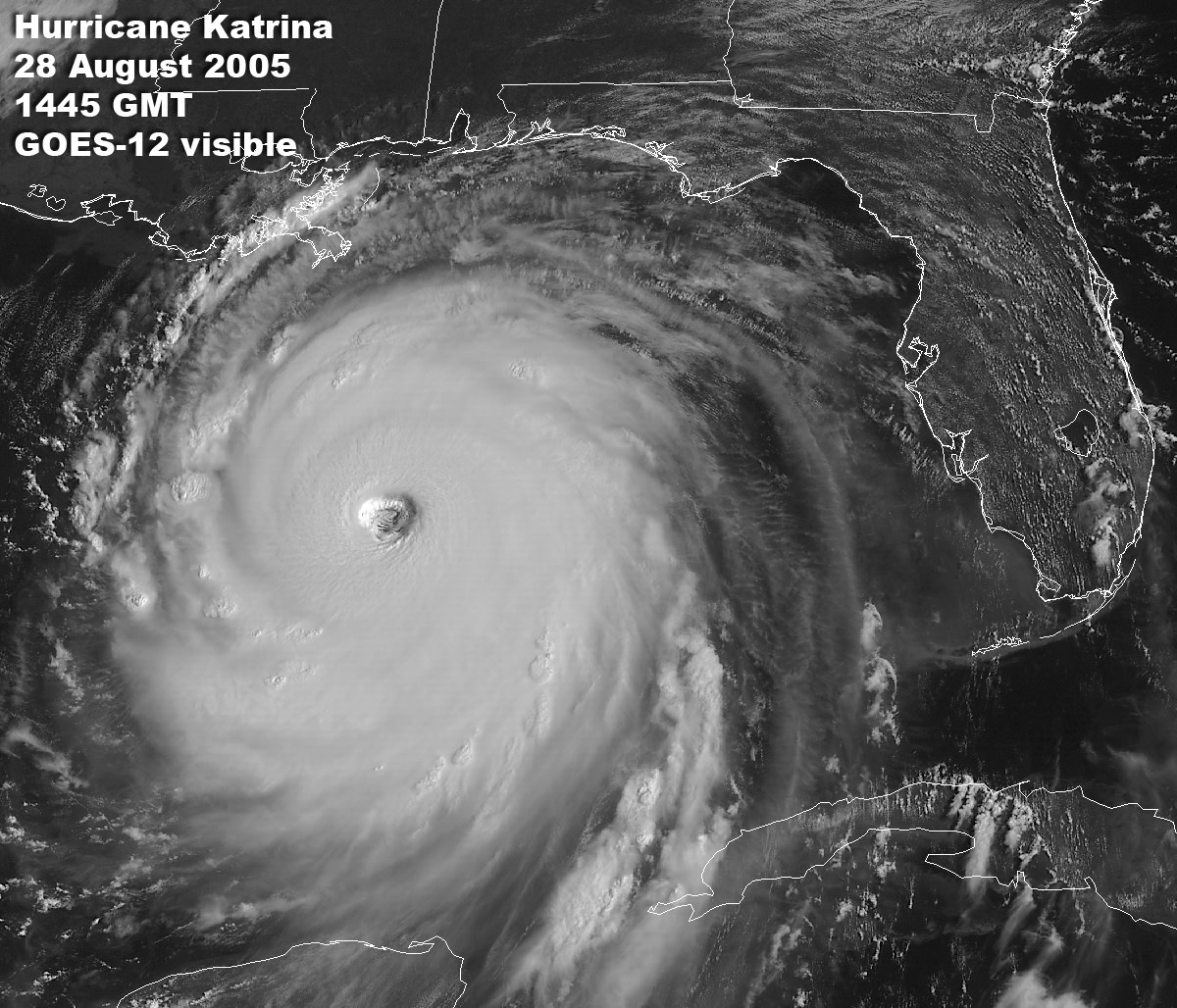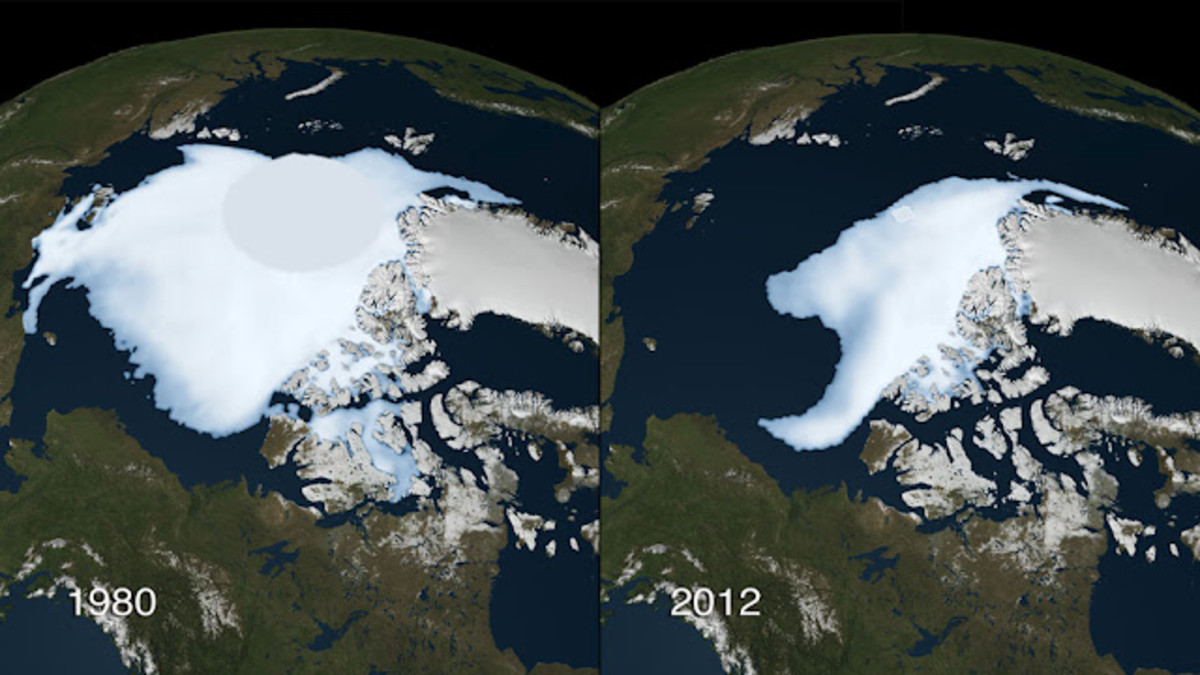ExxonMobil -- Friend or Foe?
1. ExxonMobil Is a Friend to Stockholders
ExxonMobil is Exxon Mobil Corporation, headquartered in Irving, Texas, and the world's largest publicly traded corporation in terms of profits, assets and stockholders equity -- and 2nd to Wal-Mart in revenue. In terms of market capitalization, the price of a public corporation's common stock times the number of shares outstanding, ExxonMobil's $465 billion makes it the world's richest corporation.
Business Week calls it "the most profitable company in the history of capitalism, earning a record $40.6 billion on sales of $404 billion" in 2007.
It's also the world's largest, richest and most profitable oil and gas company. What it does is extract petroleum (crude oil) and natural gas from the ground, and sell them, and refine petroleum to make products like gasoline, diesel, aviation fuel and petrochemicals, and sell them.

Big Oil on Amazon
Oil and natural gas are the only sources of energy that interest ExxonMobil. It's not interested in coal or nuclear or hydro power, and it's not interested in alternative carbon-free renewable energy sources like solar, wind or geothermal.
Other oil companies including ExxonMobil's major competitors, Royal Dutch/Shell, BP (British Petroleum) and Chevron, are showing interest in alternative energy, whether because of public pressure from concern about peak oil or climate change or because they see themselves broadly as energy companies that sooner or later (if not now) may be producing alternate forms of energy for their customers.
Not ExxonMobil.
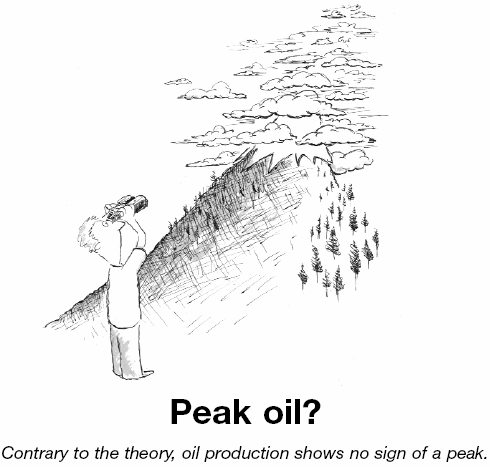
In 2006 ExxonMobil placed a full page ad in the New York Times and Washington Post entitled "Peak Oil? Contrary to the theory, oil production shows no sign of a peak." The ad asserted that "oil is a finite resource, but because it is so incredibly large, a peak will not occur this year, next year or for decades to come." ExxonMobil's CEO, Rex Tillerson, said essentially the same thing in an interview on CNBC in March 2007.
But according to ExxonMobil's 2007 Annual Report to shareholders, during the last 5 years its oil production has been essentially flat and its reserves of oil have actually declined almost 15%. Furthermore, it told analysts in March 2008 that oil production would remain flat for the next 5 years. Perhaps ExxonMobil oil has peaked even if world oil has not.
Does ExxonMobil plan to invest in new reserves? Only if the investments "are going to perform satisfactorily for our shareholders," Tillerson told CNBC.
Tillerson was setting a pretty high bar, considering that ExxonMobil's 2007 earnings, boosted by a steep increase in oil prices, represented a return of more than 30% on its shareholders' investment. Since new reserves take years to develop and are likely to be less profitable than the easy oil that's already been produced, finding reserves that will earn an annual return of 30% on investment may be difficult.
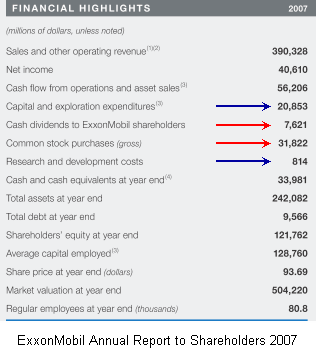
The bar was in evidence in 2007. In that year ExxonMobil spent almost twice as much on its shareholders (see red arrows in sidebar) as it did on investments in reserves and operations and on research and development (blue arrows).
Aside from a steep decrease in the price of oil, which seems unlikely as world demand for oil increases at a faster rate than world production, what could threaten the future profits of the most profitable company in the history of capitalism?
2. ExxonMobil Is a Foe of Climate Science
In January 2007 the Union of Concerned Scientists released a 64-page report accusing ExxonMobil of sponsoring and financing a disinformation campaign concerning climate change. The purpose of the campaign was to instill doubt in the minds of the public and the media that global warming was occurring and that it was being caused by human activity.
Based on the earlier campaign by Big Tobacco to create doubt that smoking was harmful to your health, ExxonMobil's campaign involved several people who had been associated with the tobacco campaign.
Global Climate Science Communications Action Plan
Project Goal
A majority of the American public, including industry leadership, recognizes that significant uncertainties exist in climate science, and therefore raises questions among those (e.g. Congress) who chart the future U.S. course on global climate change.
Progress will be measured toward the goal. A measurement of the public's perspective on climate science will be taken before the plan is launched, and the same measurement will be taken at one or more as-yet-to-be-determined intervals as the plan is implemented.
Victory Will Be Achieved When
- Average citizens "understand" (recognize) uncertainties in climate science; recognition of uncertainties becomes part of the "conventional wisdom"
- Media "understands" (recognizes) uncertainties in climate science
- Media coverage reflects balance on climate science and recognition of the validity of viewpoints that challenge the current "conventional wisdom"
- Industry senior leadership understands uncertainties in climate science, making them stronger ambassadors to those who shape climate policy
- Those promoting the Kyoto treaty on the basis of extent [sic] science appears to be out of touch with reality.
The report charged that between 1998 and 2005, the last year for which information was available, ExxonMobil had "funneled approximately $16 million [which by 2008 had increased to $23 million] to carefully chosen organizations that promote disinformation on global warming."
ExxonMobil called the report "deeply offensive and wrong."
But the Union of Concerned Scientists had documents.
One was written in April 1998, about 4 months after the Clinton Administration had joined other industrialized nations in signing a treaty in Kyoto, Japan to reduce emissions of climate-changing greenhouse gases. The document noted that "the Clinton Administration's action, if eventually approved by the U.S. Senate, will mainly affect emissions from fossil fuel (gasoline, coal, natural gas, etc.) combustion."
The document was an action plan to "inform the American public that science does not support the precipitous actions Kyoto would dictate, thereby providing a climate for the right policy decisions to be made." See sidebar for details. It was drafted by the Global Climate Science Team that included representatives of the American Petroleum Institute, Chevron and ExxonMobil.
We asked earlier what could threaten ExxonMobil's future profits. This action plan and the other evidence gathered by the Union of Concerned Scientists suggests that the management of ExxonMobil regards the regulation of fossil fuel emissions by the U.S. Government as a very serious threat.
So far that threat has been avoided. Shortly after taking office in 2001, the administration of George W. Bush withdrew the U.S. from the Kyoto treaty.
Heartland Institute Conference
The Wall Street Journal defended the conference.
The science blog RealClimate critiqued the conference with this article: What if you held a conference, and no (real) scientists came?
Since Tillerson took over as CEO in 2006, ExxonMobil has cut back on the number of organizations promoting climate skepticism that it finances, although in 2008 it was still contributing to an estimated 28 such organizations.
Why the change?
One likely reason is the ever growing consensus in the scientific community that the Earth is warming because of increased greenhouse gas emissions caused by fossil fuel combustion. Another is the scorn directed at climate-skeptic groups like The Heartland Institute, which used to be funded by ExxonMobil. See sidebar.
3. ExxonMobil Is a Friend to Certain Government Officials
The First Amendment protects the right to petition the government and the right of free speech, among other rights of self expression, and the Supreme Court equates the giving of money to influence governmental action with free speech.
Today, these rights are exercised by corporations and individuals alike in the form of
- lobbying activities, and
- donating to political campaigns and political parties.
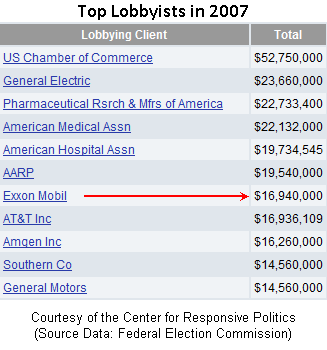
In terms of lobbying activities, ExxonMobil ranked #7 in 2007 with almost $17 million in expenditures reported to the Federal Election Commission. Among corporations (as opposed to trade and other associations), only General Electric spent more.
ExxonMobil's expenditures represented 1/5th of what the oil and gas industry as a whole spent on lobbying.
According to the nonprofit Center for Responsive Politics, ExxonMobil "long has enjoyed a close relationship with Congress, successfully lobbying to gain commercial access to federal lands as well as the rollback of several Environmental Protection Agency initiatives deemed unfriendly to the oil industry."
In terms of campaign contributions in the 2007-2008 election cycle as of July 2008, ExxonMobil has so far played a more modest role, contributing less than 4% of the oil and gas industry's total of $20 million.
Republicans received 3/4ths of the industry's contributions and 4/5ths of ExxonMobil's.
What's the difference between lobbying and donating? They're two quite different activities, but in the end they represent money paid to influence government action. Money is free speech, says the Supreme Court, and therefore lawful, but money can also be bribery, and therefore unlawful, if there's a quid pro quo - something promised in exchange for the money.
But there's always something expected in exchange for the money - some form of favorable conduct if not some specific action. Executives running public corporations don't give money to politicians or lobbyists for nothing.
Wisely or unwisely, we've given corporations the power to lobby and donate money to political parties and (indirectly through political action committees) to persons campaigning for election or reelection to Congress or the Presidency to influence governmental action. In using this power, ExxonMobil is only exercising its rights as a corporate citizen.
The real problem, former Senator Fritz Hollings (D. SC) told Bill Moyers, is that Senators and Representatives no longer have time to legislate because they have to work 24/7 to raise money for their next reelection campaign. So now "legislation is made down on K Street" where the lobbyists have their Washington, D.C. offices. "They tell you when to vote, when they got the votes."
Congress outsourcing its own constitutional functions to lobbyists is an issue of constitutional magnitude - but it's Congress' issue to fix, or our issue as electors of Congress. Dogs bark, birds fly, and corporations spend money to buy government influence to enhance their stockholders' profits from whoever is willing to sell it.
You can view a list of members of Congress who received contributions from the oil and gas industry and how they voted on key issues in the web page, Follow the Oil Money, and then draw your own conclusions.
Climate Change on Amazon
4. ExxonMobil Will Be a Foe of Regulating Oil and Gas Emissions
In February 2007, for the first time, ExxonMobil admitted the existence of climate change when CEO Rex Tillerson said, "We know our climate is changing, the average temperature of the earth is rising, and greenhouse-gas emissions are increasing."
But ExxonMobil is still funding a number of organizations that exist to sow doubt whether global warming is occurring and whether global warming is related to human burning of fossil fuels.
In ExxonMobil's culture, stockholders and their profits come first. Perhaps employees come next. Customers, the environment, renewable energy, the future of Planet Earth - all are less important, especially when their interests conflict with the interests of the corporation in achieving maximum profits and payout for its stockholders.
Since government restrictions on fossil fuel emissions to forestall future climate crisis will almost surely reduce ExxonMobil's profits, ExxonMobil can be expected to use its formidable resources as a lobbyist, campaign contributor and purveyor of misinformation about climate science to oppose and obstruct the enactment of these restrictions.
We should be prepared.
Web Sites
- ExxonSecrets | Greenpeace USA
ExxonSecrets is a Greenpeace research project highlighting the more than a decade-long campaign to deny the urgency of the scientific consensus on global warming and delay action to fix the problem. - Exxpose Exxon | Home
The Exxpose Exxon campaign is a collaborative effort of some of the nation's largest environmental and public advocacy organizations to educate and activate the public about ExxonMobil's efforts to block action on global warming.
Your Comments
Your comments will be appreciated.
Thank you.





